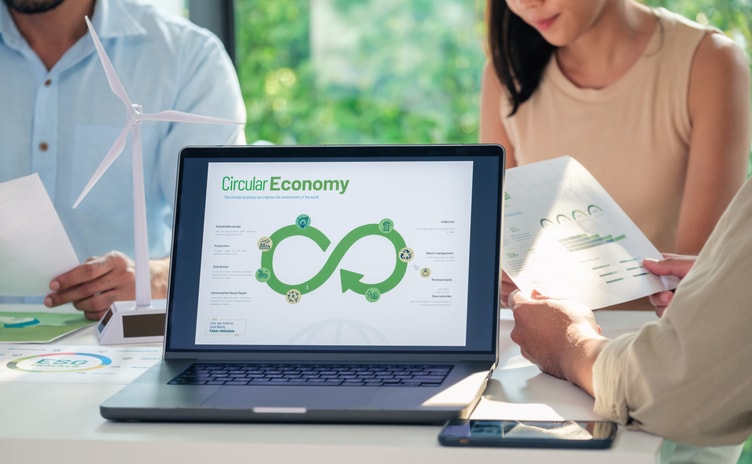Thursday, February 16, 2023
Although something as mundane as grocery shopping might not seem very important, the consumption decisions of every citizen add up, and the sum has the potential to drive system change towards sustainability.
By Luis Meyer
Several studies demonstrate that citizens are choosing to consume based on criteria that go beyond the product itself, taking into account its impact on the environment. This is confirmed by the study Green Response Report 2021, prepared by the company Essity, according to which 57% of Spaniards have lead a more sustainable lifestyle since the pandemic, 73% recycle more than before, 50% have reduced food waste, and 48% consume less energy.
In domestic consumption—that is, daily purchases—citizens are increasingly positioning themselves in favor of the environment and social justice, demanding that companies do the same. And they do so through very basic everyday activities: deciding whether to buy certain products or not and, in general, choosing how they consume in their daily lives. Two out of three Spaniards are willing to make consumption decisions for sustainability reasons, as reflected in the Sustainability and Consumption Study 2022 by El Observatorio Cetelem.
The way we move around also has a direct influence on the environment. In this regard, 60% of the population is willing to opt for more sustainable mobility options, as revealed in a survey by Think Young for the European Rail Supply Association, conducted by Europa Press. Among these alternatives, car sharing, i.e., car sharing versus car ownership, is gaining more and more traction, as a recent study by the University of Comillas reminds us, and respondents even prefer to opt for electric bicycles whenever possible.
Household energy consumption is also undergoing changes in pursuit of the ecological transition, as shown by the increase in demand for renewable energies in the total consumed: today they already account for 19.4% of the total, only narrowly surpassed by natural gas (just over 20%), according to Statista. The latest report published by HomeServe also reveals that 42% of Spaniards plan to install solar panels in their homes in the future. Citizen awareness can be found not only in the type of energy consumed, but also in the quantity: Spain is the third country in the European Union with the lowest final energy consumption per capita in the home, according to Eurostat, which reveals a clear stance against waste, making us more resilient in the face of economic crises and, at the same time, more environmentally responsible.
Making conscious food and clothing choices
The food industry is another key sector in the fight against climate change: the study The Global Impacts of Food Production, published in the journal Science by scientists at Oxford University, warns that at least 25% of greenhouse gas emissions come from what we eat (or more specifically, from the way food is produced and transported). It’s also, paradoxically, one of the sectors that best illustrates the power of change: the fact that restaurants and supermarkets are increasingly opting for local, organic, or vegan products is a consequence of citizen pressure and demands. The fact is that Spaniards are consuming more and more local products, so-called zero kilometer products. As reflected in a market study by the consulting firm Kantar, 74% of consumers prefer local products to imported ones.

Citizens can also influence the way other industries, such as the textiles, produce. Sustainable businesses in Spain—that is, those that manufacture with materials and processes with a lower carbon footprint than conventional ones—continue to increase every year: in 2021 130 of these brands had already joined the Sustainable Fashion Association of Spain (AMSE). However, there’s still a stumbling block to be solved to definitively implement these sustainable practices: the price. This was recognized by the president of AMSE, Marina Lopez, in an interview for the publication Green and Blue, although she pointed out that, in general, clothing made using organic methods tends to last longer.
Shopping wisely, in short, not only adjusts production to what we really need (which means consuming less resources), but also influences the way we manufacture, transport, and sell. The Christmas season is a clear example of this. According to the U.S. Environmental Protection Agency, 25% more waste is produced in the United States between Thanksgiving and New Year's Day than the rest of the year. In our case, the figure is even more worrying: each Spaniard generates four million tons of waste annually, 30% of which corresponds to the Christmas season, according to the latest INE study.
Although we tend to blame the way we produce for our current environmental issues, we cannot ignore our responsibility as consumers. And that requires a change of priorities, as Vance Packard recalled in 1960 in The Waste Makers: "... the lives of [most citizens] have become so intermeshed with acts of consumption that they tend to gain their feelings of significance in life from these acts of consumption rather than from their meditations, achievements, inquiries, personal worth, and service to others."
¿Te ha parecido interesante?





